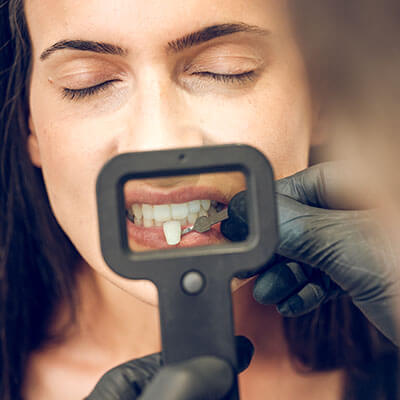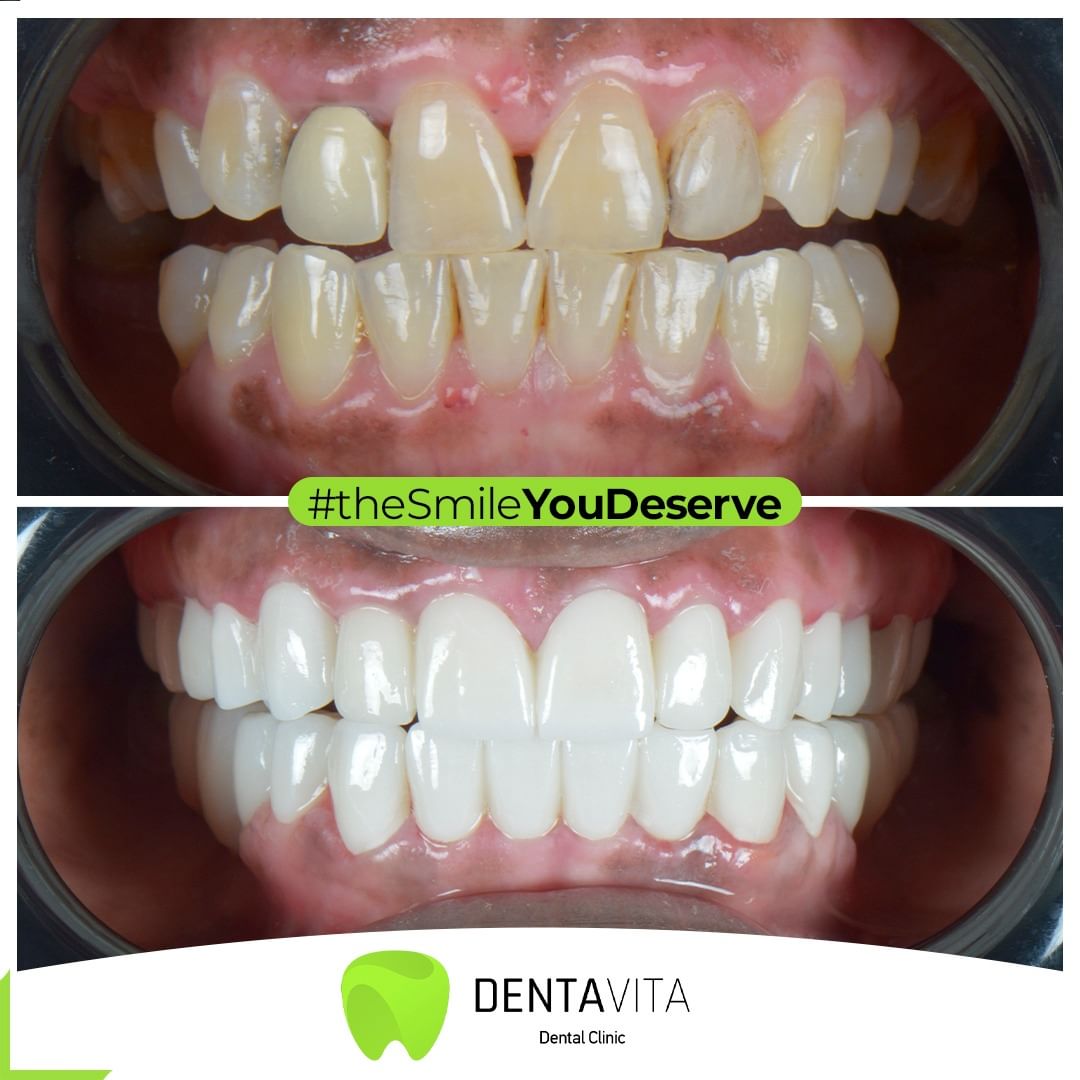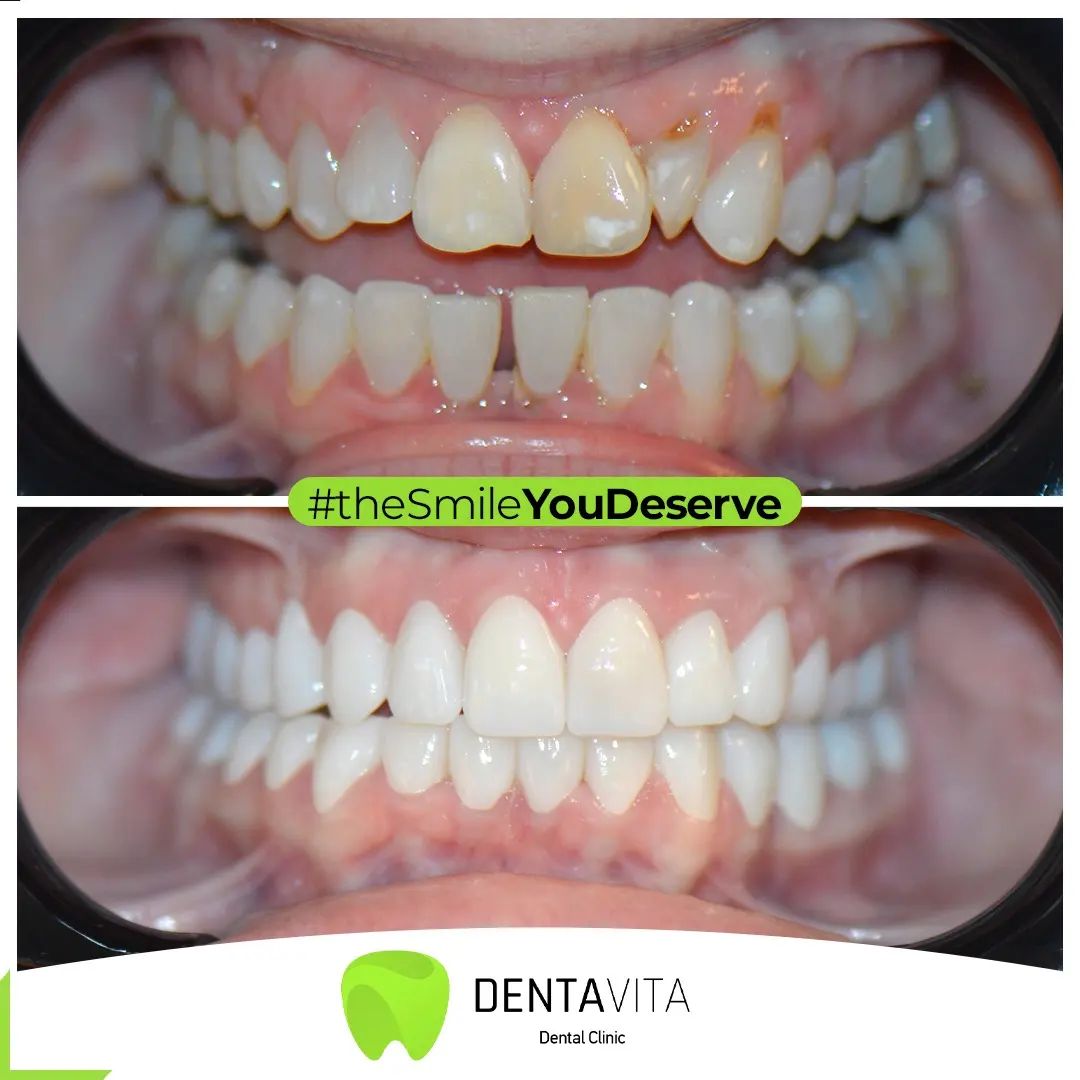Porcelain Veneers Turkey, How much are porcelain veneers in Istanbul?
What is Dental Veneers? What is Porcelain Teeth?

Porcelain veneer is the process of veneer the tooth surface for therapeutic purposes or to increase aesthetic beauty. Since the material used in this dental veneer method is a material with high light transmittance, it is perfect for those who dream of an aesthetic smile. With porcelain tooth veneer, color differences in teeth can be eliminated, crowding that is not at the orthodontic level can be corrected with porcelain tooth veneer.
The teeth can be adjusted in a natural tooth color that is compatible with the skin color of the person or in a lighter whiteness upon request. Thus, individuals can have beautiful smiles without losing almost anything from their dental functions (chewing, speaking…). They are very durable products with very high biocompatibility.
The veneers are fixed to the tooth with special veneer dental adhesives that are applied to the tooth surface to be porcelain veneered. Thanks to these veneers, the underlying tooth becomes stronger and more resistant to decay since it does not come into direct contact with food.
What are the Types of Dental Veneers In Istanbul
Types of dental veneers take the name of the material from which the veneer is formed. Which veneer will be chosen and applied is determined by looking at the durability the patient needs in the veneer and the reason for choosing a veneer tooth. The veneer used in long bridges and the veneers used for smile aesthetics are different from each other. Types of dental veneers include:
- Metal-Based Porcelain Dental Veneer
- Full Ceramic Empress Emax Dental Veneer
- Zirconium-Based Porcelain Dental Veneer
- Porcelain Laminate Veneer, Laminated Tooth Veneer,
You can see the explanations of the listed items below
Metal-Based Porcelain Dental Veneer
It is preferred in severe losses in the tooth or teeth. Metal infrastructure suitable for the measurement is prepared for the measured teeth. After the rehearsal, necessary corrections are made if needed. The surface of the metal infrastructure is covered with porcelain. In those with very thin gingiva, this type of veneer may cause a slight graying. Porcelain veneers with metal infrastructure are economical and often preferred.
Full Ceramic Empress Emax Dental Veneer
It contains compressed porcelain. It is mostly used in front teeth or a single tooth for smile design purposes. It is a quality veneer tooth type with excellent aesthetic stance, high light transmittance, and very close to natural tooth appearance. It is not preferred for posterior molars and long bridges due to its low durability. (For detailed information, read our related article.)
Zirconium-Based Porcelain Dental Veneer
It contains zirconium. It has high biocompatibility and many advantages. It does not cause problems such as discoloration or recession in the gums. (For detailed information, read our related article.)
Porcelain Laminate Veneer, Laminated Tooth Veneer,
Laminated Tooth Veneer is also called "Leaf Veneer". It is generally applied to the anterior teeth. Since its appearance is very aesthetic, it is a type of veneer that patients often prefer. (For detailed information, read our related article.)
Who Can Have Porcelain Teeth?
People who are recommended to have porcelain veneers are listed below:
Anyone who has completed their jaw development and wants to have a porcelain tooth veneer can have this procedure done safely in our clinic.
Porcelain Veneers Before and After


Visit our Instagram to see more 'porcelain veneers before and after'.
Composite vs Porcelain Veneers
Dental aesthetic applications have gained popularity among those who want to beautify our smile and achieve a natural appearance. Two of these applications are composite and porcelain veneers. Both are thin veneers used to improve the aesthetic appearance of teeth. However, each has its own advantages and disadvantages.
Composite Veneers
Advantages:
Cost: Composite veneers are generally more economical than porcelain alternatives. This is an attractive option for patients on a budget.
Fast Application: Composite veneers can be prepared and applied on the same day. They are prepared directly in your dentist's office.
Reversible: Since minimal preparation is required on natural teeth during the application of composite veneers, the process is reversible. This means that the composite material can be removed and replaced if necessary.
Disadvantages:
Color Constancy: It should be noted that composite veneers may change color over time and are prone to staining.
Requires More Frequent Maintenance: It should be noted that composite veneers may need more frequent inspection and cleaning visits.
Porcelain Veneers
Advantages:
Durability: Porcelain veneers are generally more durable than composites and can be long-lasting.
Aesthetic Superiority: Porcelain veneers offer aesthetic results closest to natural teeth. They are very similar in color and surface texture.
Color Constancy: Porcelain veneers do not change color over time and are not prone to staining.
Disadvantages:
Cost: Porcelain veneers generally cost more than composites. Therefore, it may be a more challenging option for those on a budget.
More Tooth Damage: More tooth surface may need to be removed during the application of porcelain veneers .
More Time: The porcelain veneer procedure is more complex and requires time to shape the veneers in the laboratory. This means at least two visits.
As a result, when comparing composite veneers and porcelain veneers, factors such as the individual's budget, expectations, and tooth structure should be taken into consideration when choosing.
How is Porcelain Veneer Teeth Made?
Porcelain veneer teeth process is performed as follows, respectively.
What Should Be Considered After Porcelain Veneer Teeth Have Been Made?
What are the Advantages of Porcelain Dental Veneers?
- Resistant to breakage and cracking.
- It can be applied in all tooth colors. It is prepared to be compatible with the skin color of the person.
- It does not turn yellow even after years.
- Plaque cannot easily adhere to veneer teeth.
- Since it does not hold plaque, the probability of tartar formation is low.
- Since there are different types of porcelain veneers; The most suitable type of veneer is used in implant-supported prostheses, single-tooth veneers, and bridge prostheses.
- The surface of the veneer tooth is shiny and smooth.
- Tooth coating does not become dull over time.
- It can be used safely for many years.
- The treatment period is short.
- It is frequently used in the field of aesthetic smile design..
Frequently Asked Questions about Porcelain Veneer Teeth-Istanbul
How Much Are Porcelain Teeth Prices In Turkey?
Tooth veneer prices depend on the number of teeth to be coated with porcelain, the structure of the mouth, teeth and jaw, the type of veneer to be applied, the patient's expectations, whether other treatments are required for oral and dental health before veneer, the experience of the dentist and his team, and the location of the clinic.
For detailed information about porcelain veneer prices, we recommend that you come to our clinic and make a preliminary examination and inform our physicians about your wishes. While the veneer tooth prices are determined, your dentist will give you clear information as the veneers are specially prepared and made for each individual.
Due to the fact that the payment is in cash or in installments, the dental veneers cost may differ.
Is Porcelain Teeth Painful?
For detailed information about porcelain veneer prices, we recommend that you come to our clinic and make a preliminary examination and inform our physicians about your wishes. While the veneer tooth prices are determined, your dentist will give you clear information as the veneers are specially prepared and made for each individual.
Is Porcelain Teeth Permanent? How Long Does a Porcelain Teeth Last?
Our patients, who pay attention to their oral and dental health, hygiene and daily care, can use their porcelain veneer teeth for 10-15 years without any problems.
Are Porcelain Teethers Satisfied?
The teeth of our patients who have porcelain teeth made by our experienced dentists are very close to their natural teeth, and the veneered teeth do not lose their dental functions.
 English
English
